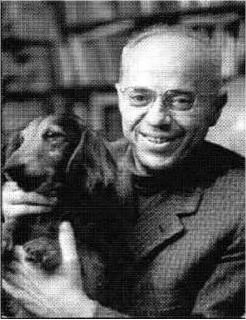Prominent Poles
Stanislaw Lem, novelist

Born: September 12, 1921,Lwów, Poland (now Lviv, Ukraine) .
Died: March 27, 2006,Cracow, Poland .
Early days.His father- a prosperous laryngologist. In 1939 he obtains secondary school certificate (matura).
Higher education. 1940-41 studies medicine at the Lwow University . 1942 after the occupation of Lwow by German forces works as a mechanic helper and welder for a German firm recovering raw materials and was a member of the resistance fighting against the Germans. With false “aryan” documents that concealed his Jewish origins, he avoided concentrations camps. 1944 after the second invasion of the Soviet army into Lwow continues medical studies
Literary debut. 1946 following the repatriation laws along with his family leaves for Krakow. He makes his debut with a novel Czlowiek z Marsa (A Man from Mars) published as several episodes in "Nowy Swiat Przygod," -48 cooperates with "Tygodnik Powszechny" and publishes poems and short stories.
1946 enrolls at the Jagiellonian University to continue medical studies.
Getting an MD degree. After finishing studies Lem receives his MD and works as a research assistant in a scientific institute, starting to write stories in his spare time. He also wrote articles in the professional press.
1947-1950 works as a junior assistant for Konwersatorium Naukoznawcze and collaborates with the monthly "Zycie Nauki." ("The Life of Science ".) He also publishes his first book Astronauci (The Astronauts).
Major works of the 50-ies. 1950s turns seriously into science fiction, publishing ASTRONAUCI (1951), OBLOK MAGELANA (1955), and EDEN (1959). He had written in 1948-49 a three-volume autobiographical novel CZAS NIEUTRACONY, but it did not appear until 1957 - due to its first volume which was a problem for the censor.
Marriage. 1953 marries M.D. Barbara Lesniak, a radiologist .
1960s Lem's visions became more independent, experimental and radical. Although the communist Polish government did not tolerate criticism, authorities regarded science fiction as an unimportant genre of literature, which made possible to ask politically forbidden questions about progress under the disguise of harmless fantasy.
Novels and stories of the 60-ies. He wrote among others CYBERIADA (1965, The Cyberiad), OPOWIESCI O PILOCIE PIRXIE (1968), stories about Pilot Pirx, and SUMMA TECHNOLOGIAE (1964), philosophical essays. Lem's most famous novel Solaris is among the classic science fiction novels of the 1960s. In it the author explores one of his favorite subjects - the limitations of human understanding. Andrei Tarkovsky's film adaptation of the novel from 1972 has been called the 2001: A Space Odyssey of Russian sci-fi cinema.
1968 birth of his son .
1970 receives a prize from the minister of foreign affairs for popularization of Polish culture abroad. Writes adventure stories about Ijon Tichy, an astronaut. Also Memoirs Found in a Bathtub (trans. 1973), Return from the Stars (trans. 1980), Imaginary Magnitude (trans. 1984), One Human Minute (1986), FIASKO (1986, trans. 1987). In his memoirs, Highcastle: A Remembrance (1997), the author describes his childhood as the son of a doctor in Lwow between the two world wars. His favorite writers were Sienkiewicz, Verne, Dumas and Wells.
Honors and awards. 1972 becomes member of the committee of Polska Akademia Nauk (Polish Academy of Sciences) and Polska 2000 (Poland 2000).
1973 A literary prize of the ministry of culture; honorary member of the Science Fiction Writers of America
1976 State Prize of the first degree for literature
1981 receives a honorary degree from the Wroclaw Polytechnic
1982 departure for a one-year scholarship of Wissenschaftskolleg in West Berlin.
Moves to Vienna. 1983-88 temporary residence in Vienna
1986 awarded Austrian state prize for European Culture for 1985
Returns to Poland. 1988 returns to Poland
1991 Austrian Kafka-prize for Literature
Later honors and awards. 1994 becomes a member of PAU (Polska Akademia Umiejętnosci)
1996 receives the Medal of the White Eagle
1997 receives honorary citizenship of the city of Krakow
1998 honorary degrees from: Opole University, State Medical University in Lviv, Jagiellonian University.
Worldwide success. Several of Lem's books were translated into English in the 1980s, and his writings appeared in such magazines as The New Yorker, Penthouse, and Omni . From 1983 Lem has lived in Austria and Italy, but he has not identified himself with the dissident writers. After writing POKŇJ NA ZIEMI (1987), Lem announced that he will finish his career as a novelist and publish only essays and columns. Lem expressed his disappointment in current science fiction in Microwords: Writings on Science Fiction and Fantasy (1984). However, in 2000 Lem published a new novel, OKAMGNIENIE, about how the word ends happily. Lem's books have been translated into some 30 languages and sold some 12 million copies. He is probably the best single sci-fi author of the late 20th century not to write in English. Lem often writes in comical style, but examines serious moral questions about technological progress, the limits of science, and our place in the universe.
For further reading: Stanislaw Lem by E. Balcerzak (1973); New Worlds for Old by David Ketterer (1974); Just the Other Day: Essays on the Suture of the Future, ed. by Luk de Vois (1985); Stanislaw Lem by Richard E. Ziegfeld (1985 in Science Fiction Studies, vol. 13); Hard Science Fiction, ed. by George E. Slusser and Eric S. Rabkin (1986); Stanislaw Lem by J. Madison Davis (1987); Rozmowy ze Stanislawem Lemem, with Stanislaw Berés (1987); Contemporary World Writers, ed. by Tracy Chevalier (1993); A Stanislaw Lem Reader, ed. by Peter Swirski (1997)
Based on the biography by Petri Liukkonen, Chief Librarian Kuusankoski Library Finland, with the permission of the author. See the original at:
Liukkonen
English translations of some of his works:
Constance J. Ostrowski
Return to home page:
Prominent Poles
